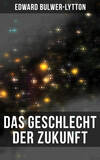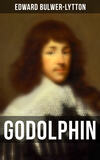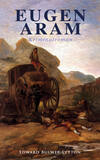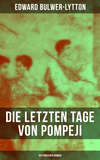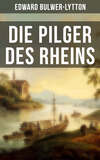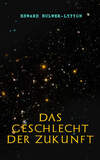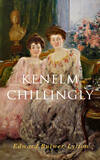Kitabı oku: «A Strange Story — Complete», sayfa 33
“How long I slept I know not,—a long dream of solitude, fever, and anguish. Was it the curse of the Dervish’s carpet? Was it a taint in the walls of the house, or of the air, which broods sickly and rank over places where cities lie buried? I know not; but the Pest of the East had seized me in slumber. When my senses recovered I found myself alone, plundered of my arms, despoiled of such gold as I had carried about me. All had deserted and left me, as the living leave the dead whom the Plague has claimed for its own. As soon as I could stand I crawled from the threshold. The moment my voice was heard, my face seen, the whole squalid populace rose as on a wild beast,—a mad dog. I was driven from the place with imprecations and stones, as a miscreant whom the Plague had overtaken while plotting the death of a holy man. Bruised and bleeding, but still defying, I turned in wrath on that dastardly rabble; they slunk away from my path. I knew the land for miles around. I had been in that land years, long years ago. I came at last to the road which the caravans take on their way to Damascus. There I was found, speechless and seemingly lifeless, by some European travellers. Conveyed to Damascus, I languished for weeks between life and death. But for the virtue of that essence, which lingered yet in my veins, I could not have survived—even thus feeble and shattered. I need not say that I now abandoned all thought of discovering the Dervish. I had at least his secret, if I had failed of the paltry supply he had drawn from its uses. Such appliances as he had told me were needful are procured in the East with more ease than in Europe. To sum up, I am here, instructed in all the knowledge, and supplied with all the aids, which warrant me in saying, ‘Do you care for new life in its richest enjoyments, if not for yourself, for one whom you love and would reprieve from the grave? Then, share with me in a task that a single night will accomplish, and ravish a prize by which the life that you value the most will be saved from the dust and the worm, to live on, ever young, ever blooming, when each infant, new-born while I speak, shall have passed to the grave. Nay, where is the limit to life, while the earth hides the substance by which life is renewed?”
I give as faithfully as I can recall them the words in which Margrave addressed me. But who can guess by cold words transcribed, even were they artfully ranged by a master of language, the effect words produce when warm from the breath of the speaker? Ask one of an audience which some orator held enthralled, why his words do not quicken a beat in the reader’s pulse, and the answer of one who had listened will be, “The words took their charm from the voice and the eye, the aspect, the manner, the man!” So it was with the incomprehensible being before me. Though his youth was faded, though his beauty was dimmed, though my fancies clothed him with memories of abhorrent dread, though my reason opposed his audacious beliefs and assumptions, still he charmed and spell-bound me; still he was the mystical fascinator; still, if the legends of magic had truth for their basis, he was the born magician,—as genius, in what calling soever, is born with the gift to enchant and subdue us.
Constraining myself to answer calmly, I said, “You have told me your story; you have defined the object of the experiment in which you ask me to aid. You do right to bid me postpone my replies or my questions. Seek to recruit by sleep the strength you have so sorely tasked. To-morrow—”
“To-morrow, ere night, you will decide whether the man whom out of all earth I have selected to aid me shall be the foe to condemn me to perish! I tell you plainly I need your aid, and your prompt aid. Three days from this, and all aid will be too late!”
I had already gained the door of the room, when he called to me to come back.
“You do not live in this but, but with your family yonder. Do not tell them that I am here; let no one but yourself see me as I now am. Lock the door of the hut when you quit it. I should not close my eyes if I were not secure from intruders.”
“There is but one in my house, or in these parts, whom I would except from the interdict you impose. You are aware of your own imminent danger; the life, which you believe the discovery of a Dervish will indefinitely prolong, seems to my eye of physician to hang on a thread. I have already formed my own conjecture as to the nature of the disease that enfeebles you. But I would fain compare that conjecture with the weightier opinion of one whose experience and skill are superior to mine. Permit me, then, when I return to you to-morrow, to bring with me the great physician to whom I refer. His name will not, perhaps, be unknown to you: I speak of Julius Faber.”
“A physician of the schools! I can guess well enough how learnedly he would prate, and how little he could do. But I will not object to his visit, if it satisfies you that, since I should die under the hands of the doctors, I may be permitted to indulge my own whim in placing my hopes in a Dervish. Yet stay. You have, doubtless, spoken of me to this Julius Faber, your fellow-physician and friend? Promise me, if you bring him here, that you will not name me,—that you will not repeat to him the tale I have told you, or the hope which has led me to these shores. What I have told you, no matter whether, at this moment, you consider me the dupe of a chimera, is still under the seal of the confidence which a patient reposes in the physician he himself selects for his confidant. I select you, and not Julius Faber!”
“Be it as you will,” said I, after a moment’s reflection. “The moment you make yourself my patient, I am bound to consider what is best for you. And you may more respect, and profit by, an opinion based upon your purely physical condition than by one in which you might suppose the advice was directed rather to the disease of the mind than to that of the body.”
“How amazed and indignant your brother-physician will be if he ever see me a second time! How learnedly he will prove that, according to all correct principles of science and nature, I ought to be dead!”
He uttered this jest with a faint weary echo of his old merry, melodious laugh, then turned his face to the wall; and so I left him to repose.
CHAPTER LXXV
I found Mrs. Ashleigh waiting for me in our usual sitting-room. She was in tears. She had begun to despond of Lilian’s recovery, and she infected me with her own alarm. However, I disguised my participation in her fears, soothed and sustained her as I best could, and persuaded her to retire to rest. I saw Faber for a few minutes before I sought my own chamber. He assured me that there was no perceptible change for the worse in Lilian’s physical state since he had last seen me, and that her mind, even within the last few hours, had become decidedly more clear. He thought that, within the next twenty-four hours, the reason would make a strong and successful effort for complete recovery; but he declined to hazard more than a hope that the effort would not exhaust the enfeebled powers of the frame. He himself was so in need of a few hours of rest that I ceased to harass him with questions which he could not answer, and fears which he could not appease. Before leaving him for the night, I told him briefly that there was a traveller in my but smitten by a disease which seemed to me so grave that I would ask his opinion of the case, if he could accompany me to the hut the next morning.
My own thoughts that night were not such as would suffer me to sleep.
Before Margrave’s melancholy state much of my former fear and abhorrence faded away. This being, so exceptional that fancy might well invest him with preternatural attributes, was now reduced by human suffering to human sympathy and comprehension; yet his utter want of conscience was still as apparent as in his day of joyous animal spirits. With what hideous candour he had related his perfidy and ingratitude to the man to whom, in his belief, he owed an inestimable obligation, and with what insensibility to the signal retribution which in most natures would have awakened remorse!
And by what dark hints and confessions did he seem to confirm the incredible memoir of Sir Philip Derval! He owned that he had borne from the corpse of Haroun the medicament to which he ascribed his recovery from a state yet more hopeless than that under which he now laboured! He had alluded, rapidly, obscurely, to some knowledge at his command “surer than man’s.” And now, even now the mere wreck of his former existence—by what strange charm did he still control and confuse my reason? And how was it that I felt myself murmuring, again and again, “But what, after all, if his hope be no chimera, and if Nature do hide a secret by which I could save the life of my beloved Lilian?”
And again and again, as that thought would force itself on me, I rose and crept to Lilian’s threshold, listening to catch the faintest sound of her breathing. All still, all dark! In that sufferer recognized science detects no mortal disease, yet dares not bid me rely on its amplest resources of skill to turn aside from her slumber the stealthy advance of death; while in yon log-hut one whose malady recognized science could not doubt to be mortal has composed himself to sleep, confident of life! Recognized science?—recognized ignorance! The science of to-day is the ignorance of to-morrow! Every year some bold guess lights up a truth to which, but the year before, the schoolmen of science were as blinded as moles.
“What, then,” my lips kept repeating,—“what if Nature do hide a secret by which the life of my life can be saved? What do we know of the secrets of Nature? What said Newton himself of his knowledge? ‘I am like a child picking up pebbles and shells on the sand, while the great ocean of Truth lies all undiscovered around me!’ And did Newton himself, in the ripest growth of his matchless intellect, hold the creed of the alchemists in scorn? Had he not given to one object of their research, in the transmutation of metals, his days and his nights? Is there proof that he ever convinced himself that the research was the dream, which we, who are not Newtons, call it?53 And that other great sage, inferior only to Newton—the calculating doubt-weigher, Descartes—had he not believed in the yet nobler hope of the alchemists,—believed in some occult nostrum or process by which human life could attain to the age of the Patriarchs?”54
In thoughts like these the night wore away, the moonbeams that streamed through my window lighting up the spacious solitudes beyond,—mead and creek, forest-land, mountaintop,—and the silence without broken by the wild cry of the night hawk and the sibilant melancholy dirge of the shining chrysococyx,55—bird that never sings but at night, and obstinately haunts the roofs of the sick and dying, ominous of woe and death.
But up sprang the sun, and, chasing these gloomy sounds, out burst the wonderful chorus of Australian groves, the great kingfisher opening the jocund melodious babble with the glee of his social laugh.
And now I heard Faber’s step in Lilian’s room,—heard through the door her soft voice, though I could not distinguish the words. It was not long before I saw the kind physician standing at the threshold of my chamber. He pressed his finger to his lip, and made me a sign to follow him. I obeyed, with noiseless tread and stifled breathing. He awaited me in the garden under the flowering acacias, passed his arm in mine, and drew me into the open pasture-land.
“Compose yourself,” he then said; “I bring you tidings both of gladness and of fear. Your Lilian’s mind is restored: even the memories which had been swept away by the fever that followed her return to her home in L—— are returning, though as yet indistinct. She yearns to see you, to bless you for all your noble devotion, your generous, greathearted love; but I forbid such interview now. If, in a few hours, she become either decidedly stronger or decidedly more enfeebled, you shall be summoned to her side. Even if you are condemned to a loss for which the sole consolation must be placed in the life hereafter, you shall have, at least, the last mortal commune of soul with soul. Courage! courage! You are man! Bear as man what you have so often bid other men submit to endure.”
I had flung myself on the ground,—writhing worm that had no home but on earth! Man, indeed! Man! All, at that moment, I took from manhood was its acute sensibility to love and to anguish!
But after all such paroxysms of mortal pain, there comes a strange lull. Thought itself halts, like the still hush of water between two descending torrents. I rose in a calm, which Faber might well mistake for fortitude.
“Well,” I said quietly, “fulfil your promise. If Lilian is to pass away from me, I shall see her, at least, again; no wall, you tell me, between our minds; mind to mind once more,—once more!”
“Allen,” said Faber, mournfully and softly, “why do you shun to repeat my words—soul to soul?”
“Ay, ay,—I understand. Those words mean that you have resigned all hope that Lilian’s life will linger here, when her mind comes back in full consciousness; I know well that last lightning flash and the darkness which swallows it up!”
“You exaggerate my fears. I have not resigned the hope that Lilian will survive the struggle through which she is passing, but it will be cruel to deceive you—my hope is weaker than it was.”
“Ay, ay. Again, I understand! Your science is in fault,—it desponds. Its last trust is in the wonderful resources of Nature, the vitality stored in the young!”
“You have said,—those resources of Nature are wondrous. The vitality of youth is a fountain springing up from the deeps out of sight, when, a moment before, we had measured the drops oozing out from the sands, and thought that the well was exhausted.”
“Come with me,—come. I told you of another sufferer yonder. I want your opinion of his case. But can you be spared a few minutes from Lilian’s side?”
“Yes; I left her asleep. What is the case that perplexes your eye of physician, which is usually keener than mine, despite all the length of my practice?”
“The sufferer is young, his organization rare in its vigour. He has gone through and survived assaults upon life that are commonly fatal. His system has been poisoned by the fangs of a venomous asp, and shattered by the blast of the plague. These alone, I believe, would not suffice to destroy him. But he is one who has a strong dread of death; and while the heart was thus languid and feeble, it has been gnawed by emotions of hope or of fear. I suspect that he is dying, not from the bite of the reptile, not from the taint of the pestilence, but from the hope and the fear that have overtasked the heart’s functions. Judge for yourself.”
We were now at the door of the hut. I unlocked it: we entered. Margrave had quitted his bed, and was pacing the room slowly. His step was less feeble, his countenance less haggard than on the previous evening.
He submitted himself to Faber’s questioning with a quiet indifference, and evidently cared nothing for any opinion which the great physician might found on his replies.
When Faber had learned all he could, he said, with a grave smile: “I see that my advice will have little weight with you; such as it is, at least reflect on it. The conclusions to which your host arrived in his view of your case, and which he confided to me, are, in my humble judgment, correct. I have no doubt that the great organ of the heart is involved in the cause of your sufferings; but the heart is a noble and much-enduring organ. I have known men in whom it has been more severely and unequivocally affected with disease than it is in you, live on for many years, and ultimately die of some other disorder. But then life was held, as yours must be held, upon one condition,—repose. I enjoin you to abstain from all violent action, to shun all excitements that cause moral disturbance. You are young: would you live on, you must live as the old. More than this,—it is my duty to warn you that your tenure on earth is very precarious; you may attain to many years; you may be suddenly called hence tomorrow. The best mode to regard this uncertainty with the calm in which is your only chance of long life, is so to arrange all your worldly affairs, and so to discipline all your human anxieties, as to feel always prepared for the summons that may come without warning. For the rest, quit this climate as soon as you can,—it is the climate in which the blood courses too quickly for one who should shun all excitement. Seek the most equable atmosphere, choose the most tranquil pursuits; and Fenwick himself, in his magnificent pride of stature and strength, may be nearer the grave than you are.”
“Your opinion coincides with that I have just heard?” asked Margrave, turning to me.
“In much—yes.”
“It is more favourable than I should have supposed. I am far from disdaining the advice so kindly offered. Permit me, in turn, two or three questions, Dr. Faber. Do you prescribe to me no drugs from your pharmacopoeia?”
“Drugs may palliate many sufferings incidental to organic disease, but drugs cannot reach organic disease itself.”
“Do you believe that, even where disease is plainly organic, Nature herself has no alternative and reparative powers, by which the organ assailed may recover itself?”
“A few exceptional instances of such forces in Nature are upon record; but we must go by general laws, and not by exceptions.”
“Have you never known instances—do you not at this moment know one—in which a patient whose malady baffles the doctor’s skill, imagines or dreams of a remedy? Call it a whim if you please, learned sir; do you not listen to the whim, and, in despair of your own prescriptions, comply with those of the patient?”
Faber changed countenance, and even started. Margrave watched him and laughed.
“You grant that there are such cases, in which the patient gives the law to the physician. Now, apply your experience to my case. Suppose some strange fancy had seized upon my imagination—that is the doctor’s cant word for all phenomena which we call exceptional—some strange fancy that I had thought of a cure for this disease for which you have no drugs; and suppose this fancy of mine to be so strong, so vivid, that to deny me its gratification would produce the very emotion from which you warn me as fatal,—storm the heart, that you would soothe to repose, by the passions of rage and despair,—would you, as my trusted physician, concede or deny me my whim?”
“Can you ask? I should grant it at once, if I had no reason to know that the thing that you fancied was harmful.”
“Good man and wise doctor! I have no other question to ask. I thank you.”
Faber looked hard on the young, wan face, over which played a smile of triumph and irony; then turned away with an expression of doubt and trouble on his own noble countenance. I followed him silently into the open air.
“Who and what is this visitor of yours?” he asked abruptly.
“Who and what? I cannot tell you.”
Faber remained some moments musing, and muttering slowly to himself, “Tut! but a chance coincidence,—a haphazard allusion to a fact which he could not have known!”
“Faber,” said I, abruptly, “can it be that Lilian is the patient in whose self-suggested remedies you confide more than in the various learning at command of your practised skill?”
“I cannot deny it,” replied Faber, reluctantly. “In the intervals of that suspense from waking sense, which in her is not sleep, nor yet altogether catalepsy, she has, for the last few days, stated accurately the precise moment in which the trance—if I may so call it—would pass away, and prescribed for herself the remedies that should be then administered. In every instance, the remedies so self-prescribed, though certainly not those which would have occurred to my mind, have proved efficacious. Her rapid progress to reason I ascribe to the treatment she herself ordained in her trance, without remembrance of her own suggestions when she awoke. I had meant to defer communicating these phenomena in the idiosyncrasy of her case until our minds could more calmly inquire into the process by which ideas—not apparently derived, as your metaphysical school would derive all ideas, from preconceived experiences—will thus sometimes act like an instinct on the human sufferer for self-preservation, as the bird is directed to the herb or the berry which heals or assuages its ailments. We know how the mesmerists would account for this phenomenon of hygienic introvision and clairvoyance. But here, there is no mesmerizer, unless the patient can be supposed to mesmerize herself. Long, however, before mesmerism was heard of, medical history attests examples in which patients who baffled the skill of the ablest physicians have fixed their fancies on some remedy that physicians would call inoperative for good or for harm, and have recovered by the remedies thus singularly self-suggested. And Hippocrates himself, if I construe his meaning rightly, recognizes the powers for self-cure which the condition of trance will sometimes bestow on the sufferer, ‘where’ (says the father of our art) ‘the sight being closed to the external, the soul more truthfully perceives the affections of the body.’ In short—I own it—in this instance, the skill of the physician has been a compliant obedience to the instinct called forth in the patient; and the hopes I have hitherto permitted myself to give you were founded on my experience that her own hopes, conceived in trance, had never been fallacious or exaggerated. The simples that I gathered for her yesterday she had described; they are not in our herbal. But as they are sometimes used by the natives, I had the curiosity to analyze their chemical properties shortly after I came to the colony, and they seemed to me as innocent as lime-blossoms. They are rare in this part of Australia, but she told me where I should find them,—a remote spot, which she has certainly never visited. Last night, when you saw me disturbed, dejected, it was because, for the first time, the docility with which she had hitherto, in her waking state, obeyed her own injunctions in the state of trance, forsook her. She could not be induced to taste the decoction I had made from the herbs; and if you found me this morning with weaker hopes than before, this is the real cause,—namely, that when I visited her at sunrise, she was not in sleep but in trance, and in that trance she told me that she had nothing more to suggest or reveal; that on the complete restoration of her senses, which was at hand, the abnormal faculties vouchsafed to trance would be withdrawn. ‘As for my life,’ she said quietly, as if unconscious of our temporary joy or woe in the term of its tenure here,—‘as for my life, your aid is now idle; my own vision obscure; on my life a dark and cold shadow is resting. I cannot foresee if it will pass away. When I strive to look around, I see but my Allen—‘”
“And so,” said I, mastering my emotions, “in bidding me hope, you did not rely on your own resources of science, but on the whisper of Nature in the brain of your patient?”
“It is so.”
We both remained silent some moments, and then, as he disappeared within my house, I murmured,—
“And when she strives to look beyond the shadow, she sees only me! Is there some prophet-hint of Nature there also, directing me not to scorn the secret which a wanderer, so suddenly dropped on my solitude, assures me that Nature will sometimes reveal to her seeker? And oh! that dark wanderer—has Nature a marvel more weird than himself?”
“Besides the three great subjects of Newton’s labours—the fluxional calculus, physical astronomy, and optics—a very large portion of his time, while resident in his college, was devoted to researches of which scarcely a trace remains. Alchemy, which had fascinated so many eager and ambitious minds, seems to have tempted Newton with an overwhelming force. What theories he formed, what experiments he tried, in that laboratory where, it is said, the fire was scarcely extinguished for weeks together, will never be known. It is certain that no success attended his labours; and Newton was not a man—like Kepler—to detail to the world all the hopes and disappointments, all the crude and mystical fancies, which mixed themselves up with his career of philosophy... Many years later we find Newton in correspondence with Locke, with reference to a mysterious red earth by which Boyle, who was then recently dead, had asserted that he could effect the grand desideratum of multiplying gold. By this time, however, Newton’s faith had become somewhat shaken by the unsatisfactory communications which he had himself received from Boyle on the subject of the golden recipe, though he did not abandon the idea of giving the experiment a further trial as soon as the weather should become suitable for furnace experiments.”—Quarterly Review, No. 220, pp. 125, 126.
[Закрыть]
Southey, in his “Doctor,” vol. vi. p. 2, reports the conversation of Sir Kenelm Digby with Descartes, in which the great geometrician said, “That as for rendering man immortal, it was what he could not venture to promise, but that he was very sure he could prolong his life to the standard of the patriarchs.” And Southey adds, “that St. Evremond, to whom Digby repeated this, says that this opinion of Descartes was well known both to his friends in Holland and in France.” By the stress Southey lays on this hearsay evidence, it is clear that he was not acquainted with the works and biography of Descartes, or he would have gone to the fountain-head for authority on Descartes’s opinions, namely, Descartes himself. It is to be wished that Southey had done so, for no one more than he would have appreciated the exquisitely candid and lovable nature of the illustrious Frenchman, and the sincerity with which he cherished in his heart whatever doctrine he conceived in his understanding. Descartes, whose knowledge of anatomy was considerable, had that passion for the art of medicine which is almost inseparable from the pursuit of natural philosophy. At the age of twenty-four he had sought (in Germany) to obtain initiation into the brotherhood of the Rosicrucians, but unluckily could not discover any member of the society to introduce him. “He desired,” says Cousin, “to assure the health of man, diminish his ills, extend his existence. He was terrified by the rapid and almost momentary passage of man upon earth. He believed it was not, perhaps, impossible to prolong its duration.” There is a hidden recess of grandeur in this idea, and the means proposed by Descartes for the execution of his project were not less grand. In his “Discourse on Method,” Descartes says, “If it is possible to find some means to render generally men more wise and more able than they have been till now, it is, I believe, in medicine that those means must be sought... I am sure that there is no one, even in the medical profession, who will not avow that all which one knows of the medical art is almost nothing in comparison to that which remains to learn, and that one could be exempted from an infinity of maladies, both of body and mind, and even, perhaps, from the decrepitude of old age, if one had sufficient lore of their causes and of all the remedies which nature provides for them. Therefore, having design to employ all my life in the research of a science so necessary, and having discovered a path which appears to me such that one ought infallibly, in following, to find it, if one is not hindered prematurely by the brevity of life or by the defects of experience, I consider that there is no better remedy against those two hindrances than to communicate faithfully to the public the little I have found,” etc. (“Discours de la Methode,” vol. i. OEuvres de Descartes, Cousin’s Edition.) And again, in his “Correspondence” (vol. ix. p. 341), he says: “The conservation of health has been always the principal object of my studies, and I have no doubt that there is a means of acquiring much knowledge touching medicine which, up to this time, is ignored.” He then refers to his meditated Treatise on Animals as only an entrance upon that knowledge. But whatever secrets Descartes may have thought to discover, they are not made known to the public according to his promise. And in a letter to M. Chanut, written in 1646 (four years before he died), he says ingenuously: “I will tell you in confidence that the notion, such as it is, which I have endeavoured to acquire in physical philosophy, had greatly assisted me to establish certain foundations for moral philosophy; and that I am more easily satisfied upon this point than I am on many others touching medicine, to which I have, nevertheless, devoted much more time. So that”—(adds the grand thinker, with a pathetic nobleness )—“so that, instead of finding the means to preserve life, I have found another good, more easy and more sure, which is—not to fear death.”
[Закрыть]
Chrysococyx lucidus,—namely, the bird popularly called the shining or bronzed cuckoo. “Its note is an exceedingly melancholy whistle, heard at night, when it is very annoying to any sick or nervous person who may be inclined to sleep. I have known many instances where the bird has been perched on a tree in the vicinity of the room of an invalid, uttering its mournful notes, and it was only with the greatest difficulty that it could be dislodged from its position.”—Dr. Bennett: Gatherings of a Naturalist in Australasia.
[Закрыть]




